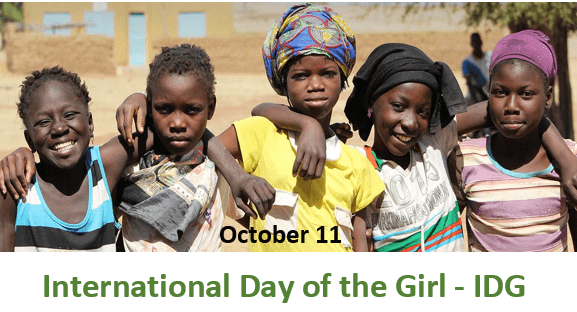International Day of the Girl 2023 – “Invest in Girls’ Rights: Our Leadership, Our Well-being”
The annual International Day of the Girl (IDG), which is commemorated on October 11, provides a global forum for promoting the complete range of girls’ rights. Girls are suffering particularly severe effects this year as a result of a variety of activities and actions that aim to restrict women’s and girls’ rights and reverse the progress made toward gender equality.
The theme of the 2023 International Day of the Girl is “Invest in Girls’ Rights: Our Leadership, Our Well-being”. António Guterres, secretary-general of the United Nations, argued for investing in girls’ leadership to help them realize their goals and advance gender equality, saying that “women and girls can lead us to a fairer future…let us amplify girls’ voices, and recommit to working together to build a world where every girl can lead and thrive.”
There is an urgent need for increased attention and funding for the critical areas that enable girls to realize their rights and realize their potential. These areas range from maternal health care and parenting support for adolescent mothers to digital and life skills training; from comprehensive sexuality education to survivor support services and violence prevention programmes.
In response to girls’ pleas for change, the international community must do more than just reiterate its commitments; it must courageously engage in the initiatives required to bring about that change. If we look closely, we can discover that many girls are already leading the charge for change in their neighborhoods.
Together with our partners in the public and private sectors, UNICEF sees a world where girls have the opportunity to influence government spending and policy, set the standards by which enterprises should conduct themselves, and determine the top priorities for new research and technologies. These instances ought to be commonplace rather than unusual.
The primary International Day of the Girl event this year, which is sponsored by Plan International and other partners, will examine how to better support girls and the challenges that concern them. Wherever you are, we hope you can join us and host a viewing party with and for girls.
2023’s International Day of the Girl Child: Importance
According to the UN, girls have a right to a secure, educated, and healthy living throughout their whole life, not only during these crucial formative years. “Girls have the potential to change the world if effectively supported during the adolescent years—both as the empowered girls of today and as tomorrow’s employees, mothers, entrepreneurs, mentors, household heads, and political leaders.”
Adolescent girls’ rights are upheld today by investing in their power, and doing so ensures a more just and prosperous future in which both halves of humanity are equal partners in resolving issues like climate change, political unrest, economic growth, disease prevention, and global sustainability.
Each of the 17 Sustainable Development Goals (SDGs) included in the Agenda for Sustainable Development 2030, which was endorsed by world leaders in 2015, places a strong emphasis on achieving gender equality and women’s empowerment. We won’t achieve justice and inclusion, economies that work for everyone, or a shared environment that is sustainable for present and future generations until we guarantee the rights of women and girls across all of the goals.
Did you realize?
- Today, approximately 1 in 5 females still do not finish lower secondary, and nearly 4 in 10 girls do not finish upper secondary.
- In low-income nations, the percentage of teenage girls and young women who do not use the internet is about 90%, compared to their male contemporaries, who are twice as likely to be online.
- In comparison to boys their age, girls aged 5 to 14 worldwide devote 160 million more hours per day to unpaid care and household duties.
- Three out of every four new HIV infections among teenagers still occur in adolescent girls.
- At least once in their lives, one in four married or cohabitating teenage girls between the ages of 15 and 19 had been physically or sexually abused by an intimate partner.
- In the ten years to come, 100 million girls were at risk of child marriage even before the COVID-19 pandemic. And now, because of the COVID-19 pandemic, up to 10 million more females globally will be at risk of getting married and having children over the course of the next ten years.




